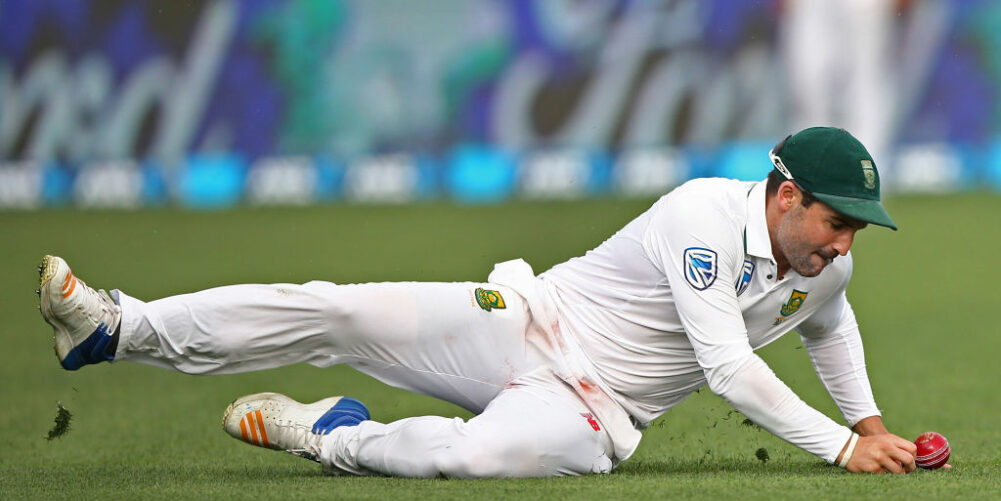(Photo: Getty Images)
By Neil Manthorp
There is something desperately missing from this English summer so far, and I’m not talking about the lack of meaningful success for the main tourists, South Africa. It seems to me that what we all really need now, with full and due respect to the Women’s World Cup, is some Test cricket.
I sense an air of curiosity about the success of the Proteas in white clothing compared to their dismal offerings in green. There was a rotten period in the 2015-16 season when they were thrashed by India on pitches that turned the concept of ‘home-ground advantage’ into a scary science, and were then well beaten by England at home. But for nine years before that, during which they were unbeaten away from home, and in the 18 months since, they have been consistently greater than the sum of their individual parts.
Four consecutive Test series victories, including a third consecutive one away to Australia, have seen them climb from sixth in the world to second. They appear to be on a roll, which is surprising because, apart from the remarkable batting of Quinton de Kock, nobody has been consistently outstanding. Kyle Abbott, so instrumental in beating the Aussies again, is no longer available after joining Hampshire as a Kolpak.
Test captain Faf du Plessis is still in Cape Town following the birth of his first child last Monday, but his designated replacement, opening batsman Dean Elgar, spoke the words du Plessis would have said before the three-day game against the England Lions at Worcester.
“We are quite fortunate that we have a lot of new faces in our Test squad now so, with regard to what’s happened in the ODIs, Champions Trophy and the T20s, that’s in the past and it’s time to crack on with the proper format of Test cricket now.”
Ah. ‘Proper format’. Elgar confesses to being “an old school traditionalist” which he is, in more ways than one. He enjoys his nickname – ‘Bulldog’ – very much. He is unconcerned with its English connotations. He is a feisty fighter, that’s all that matters. He has ground bowlers into submission at the highest level and carried his bat for an unbeaten Test century, signs of what matters to him. “I can play plenty of shots, but if batting ugly is what is required, then I’m your man. I like to annoy bowlers.”
So why has the Test team been so successful? There may be many reasons but the foremost lies in what many believed to be nothing more than a marketing gimmick five years ago – ‘Protea Fire’. Its foundations lay in a research programme to find something to which the national team could identify. Something like the ‘Three Lions’ or the ‘Baggy Green’. South Africa’s post-isolation (1991) players struggled with the dissolution of their history. Eddie Barlow, Graeme Pollock, Barry Richards – these were names not to be mentioned. The modern players were made to feel awkward and embarrassed by the ‘bad old days’.
The ‘Proteas’ brand happened by accident. Ali Bacher, chief executive of the United Cricket Board of South Africa, agreed entirely that use of the traditional Springbok as an emblem would be inappropriate. Along with the national governers of sport, they settled on the King Protea – the national flower. The desire for sports fans to have ‘badges’ to support meant the team were called the ‘Proteas’. For years it simply didn’t work and was awkward. It still is, to be fair.
The result of the research, however, was to identify that the Protea was the first plant in South Africa’s vast floral kingdom to regenerate following the bush fires which sweep the Cape and elsewhere every two or three years. The Protea is the prime survivor. It is the first to regenerate. So in a sporting sense, it doesn’t matter who represents them.
It was a concept that hit home in a big way, and especially for the Test team. A ceremony has been carried out for new caps in recent years which involves them receiving a flame within the wire frame of a Protea, accepting the responsibility of ‘new life’ following old. Like the All Blacks, the onus is on the pride and legacy of the whole, not the individual. The concept might have been entirely missed by those who heard or read Elgar’s response to a question about the difficulty of facing England without the dual genius of AB de Villiers and Dale Steyn.
“We’ve missed them for the last two series and different guys have raised their performances to cover the gaps. It’s great to have them in the team, but we have players who really want to make their positions permanent, and they have earned their right to be in the team. The game carries on – that’s very important for us.”
Somehow the concept of perpetually regenerating Proteas has missed the ODI team. There is too much reality, too much acknowledgement of the requirements of transformation and the selection quota. Or perhaps it is simply that the requirement and expectation to win at ICC events has become too large to be manageable. As De Villiers said in one of his more lucid moments before heading back to Pretoria: “There’s no doubt that something happens to us at these events.”
Something also happens to the team when they start a Test match. They refuse to accept when they are beaten, they find a way to defend an inadequate total and to conjure an unlikely wicket. England are the better team, man for man, but they will find these Proteas very difficult to pin down.















